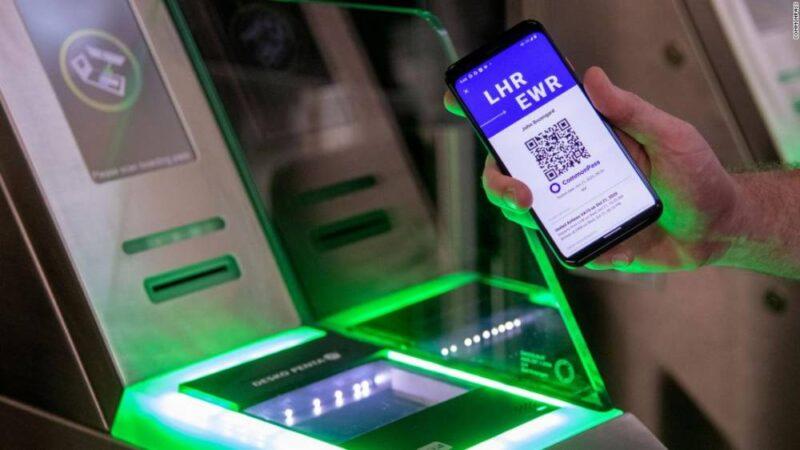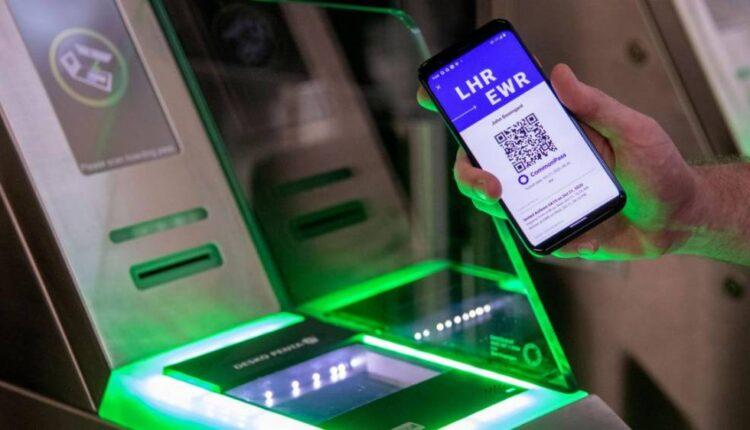New York (CNN Business)With coronavirus vaccines now rolling out across the United States, businesses and schools are considering how, and what it will take, to safely resume in-person operations.
Some of the country’s biggest tech firms and health care organizations have joined together to help facilitate that return to “normal.” The group, called the Vaccine Credential Initiative, wants to ensure that everyone has access to a secure, digital record of their Covid-19 vaccination — like a digital vaccine passport — that can be stored in people’s smartphones. The records could be used for everything from airline travel to entering concert venues. The coalition comprises a broad range of health care and tech leaders including Microsoft (MSFT), Salesforce (CRM), Oracle (ORCL), Cerner (CERN), Cigna’s (CI) Evernorth, health care software firm Epic and the Mayo Clinic, among others. The announcement Thursday comes amid a rocky start to the Covid-19 vaccine rollout. Of the 30.6 million doses of vaccines that have been distributed to US hospitals, health centers and pharmacies, only about 10.6 million people had received at least their first dose as of Friday morning, according to data from the US Centers for Disease Control and Prevention.Although it’s early in the vaccination process, potential use cases for such a technology are already cropping up. Some companies, including Dollar General (DG) and Instacart, plan to pay their workers to get vaccinated. Los Angeles Unified School District Superintendent Austin Beutner has said that once children have access to vaccines, all district students must get immunized before returning to classrooms. And some experts expect that states and countries currently requiring negative Covid-19 test results for incoming travelers will eventually also accept vaccination records. Read More”A secure, convenient solution to verify Covid-19 vaccination will play an important role in accelerating a healthy and safe return to work, school and life in general,” said Joan Harvey, president of care solutions at Evernorth, Cigna’s health services business.
The importance of digital records
The Vaccine Credential Initiative wants to create an open-source, standard model for how hospitals, pharmacies and clinics administering Covid-19 vaccines make digital records of immunizations, which can be provided to patients who want them.

If you want to travel next year, you may need a vaccine passportImmunizations are typically tracked by writing them down on a paper card for people to store with their important records, and are also kept track of in a patient’s electronic medical records.. But for a number of reasons, the Covid-19 vaccination required developing a different system. For one thing, coronavirus vaccination records will need to be more easily transported if people have to use them to access schools, offices and event venues, making a digital record more practical. They also need to be “interoperable,” meaning all organizations administering the shots should use the same model for recording vaccine credentials. “It’s not just for health care purposes that you will need this health data,” Paul Meyer, CEO of nonprofit The Commons Project, told CNN Business. The Commons Project created an app called Common Pass, where people can store digital records of their Covid-19 test results and, eventually, their Covid-19 vaccination record. “Now you are going to need either your lab results or vaccination data to get on an airplane, to go to school, go to work — real life, non-health-care use cases,” Meyer said. “And it needs to be in a standard form so when you’re presenting it, people actually understand, ‘Oh, it was the Pfizer vaccine that you got.'”The Covid-19 vaccination record also needs to be verifiable and secure in a way that was less important for past vaccination records — otherwise, a person could try to fake having gotten the Covid-19 vaccine by using someone else’s record, Meyer said. Ultimately, patients will likely receive an encrypted, digital copy of the vaccination record — think a QR code — that can be stored in a digital wallet. That way, an airport gate agent for example, could confirm that a person was vaccinated without viewing all their personal health information. It’s not the first time Big Tech has gotten involved in the effort to fight coronavirus. Early on in the pandemic, Apple (AAPL) and Google (GOOG) joined forces to develop a bluetooth-based system to notify users if they’d been exposed to Covid-19. But the tool’s success was challenged by slow and spotty adoption.
The role of tech firms
With the Vaccine Credential Initiative, the tech companies involved in the effort will play a key role in ensuring widespread use. Firms like Microsoft and Oracle manage the tech infrastructure for many large health care systems, and can build in the standards for Covid-19 vaccine credentialing. “That’s why it’s exciting to have partners like Epic and Cerner and Oracle and Microsoft that are the tech platforms that power, if you will, so much of health care,” Meyer said. “Them saying, ‘We’re going to implement the standards,” is really them saying, ‘We’re going to help our customers issue these verifiable credentials.’ And it starts to turn into something that’s very scalable.” Another potential pitfall of such a system is inequality; someone without a smartphone would be unable to access a convenient, digital record of their vaccine. However, the Vaccine Credential Initiative says it plans to provide such patients with a paper printed with a QR code containing the record.”Just as Covid-19 does not discriminate based on socio-economic status, we must ensure that convenient access to immunization records crosses the digital divide,” Brian Anderson, chief digital health physician at nonprofit research organization MITRE, a member of the initiative, said in a statement.
Source: edition.cnn.com

